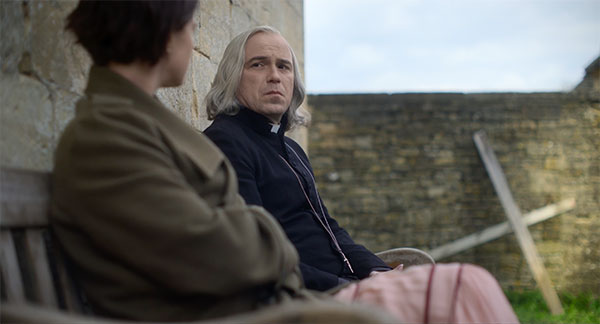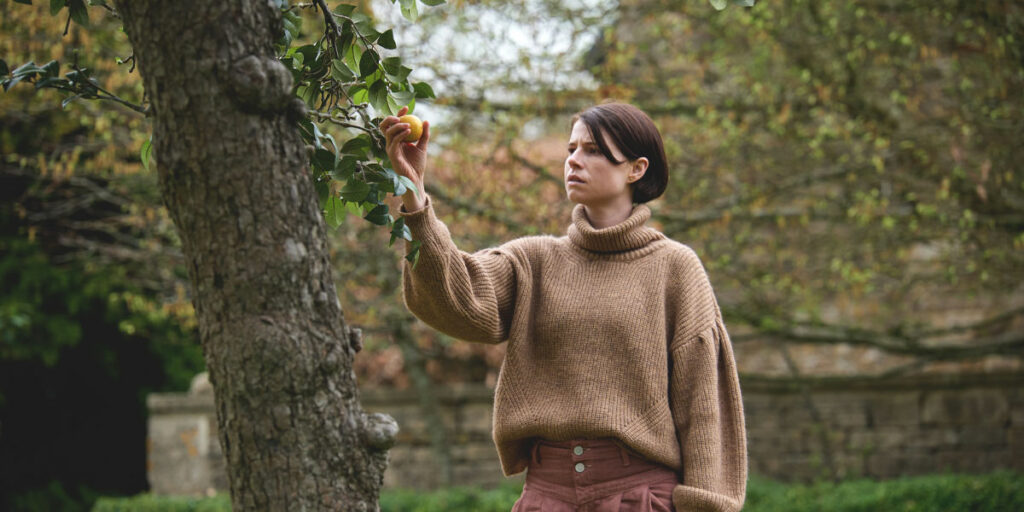Men represents Alex Garland’s return to horror and A24, serving up a social thriller that studies the malice of men, ably anchored by Jessie Buckley and Rory Kinnear.
It’s impossible to passively watch an Alex Garland project. While one may be initially mostly intrigued by the alluring genre aesthetics, it’s the rich thematic ruminations found in these films and series that linger with us long after the credits roll, whether they be centered around the consciousness of artificial intelligence (Ex Machina), humanity’s propensity for physical and mental self-destruction (Annihilation), or the eternal debate between free will and determinism (Devs).
At this point in his career, it’s mighty clear that Garland is a master at blending technical exceptionalism with thought-provoking themes – especially in the sci-fi genre – but with Men, the film that represents his return to horror and A24 after Annihilation and Devs, Garland ventures into explicit horror territory for the first time, still keeping his signature style and storytelling techniques intact, and the results are just as rewarding. While Men starts with a stereotypical set-up a horror film – a woman in mourning makes her way to the English countryside on a solo holiday to grapple with her grief before finding that things are not all as they seem – what follows is a ferociously frightening but fantastically fascinating examination of the evil of men and all the forms it takes throughout all time and history, additionally assessing its rigid roots in religion and nature and unearthing troubling truths.
After an argument that arose when Harper (Jessie Buckley, of I’m Thinking of Ending Things and The Lost Daughter) announced to her emotionally abusive husband James (Paapa Essiedu, of I May Destroy You and Murder on the Orient Express) that she intended to divorce him, James threw himself off of the balcony of their apartment, previously indicating that Harper would be been the one to push him to such an act, and she would have to live with that on her conscience. As such, what he says has come to pass, with Harper forced to bear the burden of wondering if he would still be alive if she “would’ve been a bit more compassionate,” or “allowed him to apologize one last time.”
To escape from her everyday suffering – literally and figuratively – Harper books a solo holiday for herself at a home in the English countryside, which is managed by the awkward but affable Geoffrey (Rory Kinnear, of No Time to Die and Black Mirror). However, her peace is soon disturbed when, after taking a walk one afternoon, she comes across a naked man in the woods who proceeds to stalk her, setting off a string of eerie events (seemingly tied to all of the men in this town, who all share the same face) that show to Harper that she’s not as safe as she thought she was, and her torment may have followed her on her trip.

It goes without saying, but Garland’s formal control as a filmmaker is reliably ravishing here. If there’s one thing Garland knows how to do, it’s how to carefully and considerately craft an entirely original aesthetic for his intimate genre epics, building a broad and brutal – but still oddly beautiful – world that even stretches far beyond the scenes and settings in these specific stories, making his projects feel so refreshingly lived-in as a result. Men may be limited in scope – primarily taking place around this one home in the English countryside and only occasionally veering away from this environment – but Garland so elegantly envelops it in an arresting visual and aural aura that it starts to feel as if Harper has traveled to a whole new world entirely – one that plays not by our rules, but theirs.
Such calculated stylistic curation also allows us to further embrace the absurdity that accompanies certain beats in the film’s conclusion, as this site feels not of our Earth, but of some sort of feverish fantasy – and it’s thanks to the aesthetic congruence between Garland and his crew (cinematographer Rob Hardy, editor Jake Roberts, and composers Ben Salisbury and Geoff Barrow, among others) that the tonal climate feels as convincing as it ultimately is.
However, as is also often the case with Garland’s genre offerings, it’s the messages in Men that earn our attention even more than the attractive aesthetic, with the Oscar-nominated writer digging far deeper into his central concept than one might expect – and thankfully so. It’s easy to take one look at this transparent one-word title and think you know everything this film is about and all it has to say. “All men are the same!” “All men are evil!” And so on and so forth. But while those feelings serve as the foundation for Garland’s overarching thesis, it’s the way he complicates that central concept – and additionally analyzes it from historical, religious and natural perspectives – that proves most innovative and ingenious, delivering one of the most comprehensive, complete, and chilling commentaries on men’s seemingly inescapable stronghold on all the physical and emotional power channels in society, accompanied by an assessment of all of the literal and figurative weapons at their disposal to inflict harm on those oppose them and the “natural” order of things – who often happen to be women.
In fact, there’s so much imagery relating to historical and religious events or natural phenomena that it’s absurd to assume that one can pick up on everything on one viewing alone – which is all the more reason why Garland’s valiant, vibrant vision can’t be so easily summarized through a simple reductive slogan that one might come across on social media. From the apple Harper plucks from a tree on the grounds and eats as soon as she arrives to the English countryside (aligning her actions with those of Eve and her “forbidden fruit” in the Garden of Eden) to the plant-like form Harper’s stalker takes on as the story progresses (signifying that both he – and his actions – exist as part of a larger process of nature), there’s so much here to survey about what Garland has to say regarding why the malevolence of men feels as if it has lasted forever, what systems support their spitefulness, and what forms their fury can take. It’s all the more impressive that Garland, as a man himself, is able to possess the vulnerability to not just point fingers but also be introspective and look within as well, exploring where even so-called “good men” can go wrong, and what ways they are failed by broader structures in society as they try to subvert what they were made to be and do.
Garland’s body horror is a part of his brand by now (as all who saw that “stomach scene” in Annihilation can attest), and through a mostly seamless merging of CGI and practical effects, he conjures up some stomach-churning spectacle here as well, but for women, the most terrifying elements in Men are the simpler set-ups that prey on our most innate fears relating to being on our own or conversing with strange, cagey men. In fact, the scenes Garland structures here centering around such concerns make Men one of the most viscerally unnerving horror films of the century so far – and kudos must once again be given to Garland for portraying them so perfectly, despite never having endured such events himself. In every scene in which Harper is alone with yet another variant of a man in town (always played by Rory Kinnear), they always act in a manner that is slightly and oddly off-putting, even if we can’t put our finger on why in the moment, and that interpersonal anxiety causes our mind to wander to worst-case scenarios that are far more frightening than anything Garland himself can dream up. But it’s because he propels us to those places that such thoughts arise in the first place, cleverly knowing what buttons to push and how to immerse us further into Harper’s perspective and feel her fear so intimately.
Garland is gifted with two tremendous thespians to anchor this dark descent into men’s depravity, as Jessie Buckley and Rory Kinnear do not fail him whatsoever in fulfilling their roles representative of “all women” and “all men,” respectively, while also imbuing them with individual characteristics that make Harper and each man Kinnear portrays feel like distinctive identities beyond their larger symbolic existence. Some may find that Harper is ill-defined outside of her trauma and physical/emotional torment, but Buckley is such a brilliant actor that she beautifully fills in the blanks for us, while simultaneously playing the part Garland has written perfectly.
And really, that may sum up the secret to Men’s success overall – everyone here in front of and behind the camera is working in conjunction to support Garland’s vision while still bringing their own unique strengths to the production as well, and that cohesion of cast and crew allows such an audacious and abstract story to actually achieve the lofty goals it sets for itself and “cash” the thematic “checks” it writes for itself in the first act. Some may be lost along the way, and if you’re looking for easy answers, this isn’t the film for you, but for audiences willing to do the work – and those who favor films that engage the mind as much as all our other senses – Men is a terrifying but tantalizing trip worth taking.
Men was released in US theaters on May 20, 2022, and will be out in select countries worldwide from June 1.

